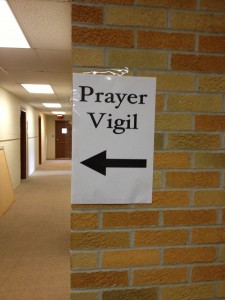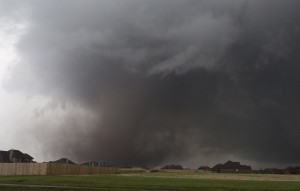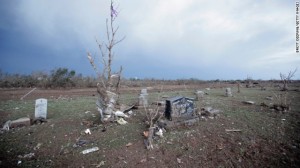 Today I participated in our church’s biannual prayer vigil. By definition, a vigil is “a period of watchful attention.” It’s sometimes coupled with fasting or staying awake during normal sleep hours to focus on something special by guarding it, observing it, or praying over it. And today we were praying.
Today I participated in our church’s biannual prayer vigil. By definition, a vigil is “a period of watchful attention.” It’s sometimes coupled with fasting or staying awake during normal sleep hours to focus on something special by guarding it, observing it, or praying over it. And today we were praying.
Those who wanted to participate signed up for a time slot and promised to pray then, either at the church or from another location. Throughout one day, the church and its current concerns would be continuously brought to God’s throne room.
Our church prayer team created a private atmosphere of tranquility for those who wanted to use it, complete with candles, a comfortable chair, a table, lamp, hymnal, Bible, and curtains drawn. The moments of people’s prayer times were set apart for just the Lord and them, yet we were all joining in one consecutive vigil much like links on a chain reaching from our prayer room to heaven.
Pages of printed verses were made available, and one of the passages I appreciated today was from Romans 4:“Abraham never wavered in believing God’s promise. In fact, his faith grew stronger, and in this he brought glory to God. He was fully convinced that God is able to do whatever he promises.” (20-21)
Abraham had an astounding faith that believed God would follow through with what he said. The promise this passage refers to is that his descendants would grow into a great nation, this when he was already old and had no children. Even more remarkable was that during this time when he believed God would come through but hadn’t seen it yet, right then Abraham’s faith “grew stronger.”
Extraordinary! And the reason? He was “fully convinced” God would keep his word.
Before I began to pray at the vigil, I asked myself a serious question. If I’m just as “fully convinced” as Abraham was, why do I sometimes “waver in believing?”
Once in a while after God does answer prayer in a measureable way, my faith gets a boost, but that’s after-the-fact. Abraham’s faith actually grew while he waited to see God act, literally waiting for decades.
As I thought about this, I saw the next phrase in Romans 4: “In this [continuing to believe against all odds], he brought glory to God.”
Light bulb moment! Believing that God will do what he promises, whether we see it in our lifetime or not, actually brings glory to God. I was wrong when I thought believing without wavering was about my own will power. Instead it’s about God’s glory. Continuing to believe when there seems to be no hope at all is one sure way I can bring blessing to my Father.
So when I began to pray today, it was easy to blanket the requests with scriptural promises, believing without wavering if for no other reason than to bring glory to him.
“Even when there was no reason for hope, Abraham kept hoping.” (Romans 4:18)






